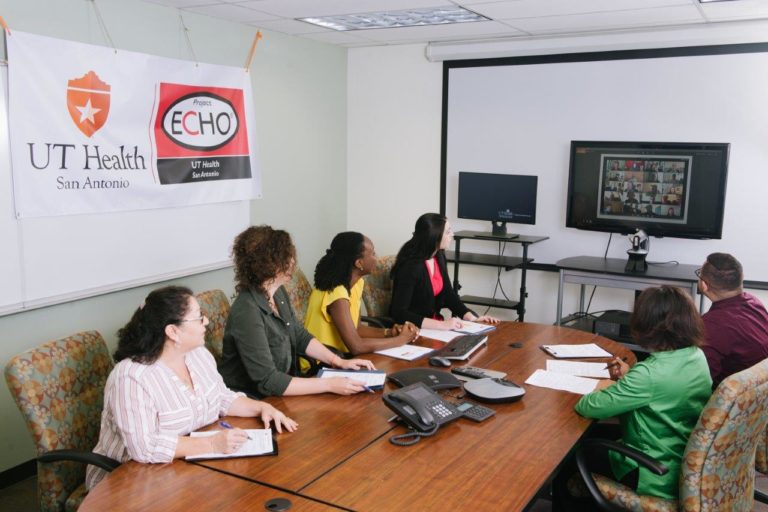SAN ANTONIO (Oct. 9, 2020) — Thanks to a $3 million grant to UT Health San Antonio, health care workers across rural America may soon have a new way of learning about the latest evidence-based care so that they can provide it to their communities.
The grant will help UT Health San Antonio develop a national initiative called Resources, Information, Support and Education (RISE) for Telementoring for Health Care in Rural Underserved Populations.
Telementoring is a way of teaching and advising individuals and groups using telecommunications and computer networks. Examples of the technology include webinars, podcasts, online video modules, individual consultation and other web-based platforms.

Over the past four years, principal investigator Wari Allison, MD, PhD., and her team have become experts in using a telementoring platform called ECHO® (Extension for Community Healthcare Outcomes). One way it has been used in South Texas has been to help the university extend its specialty expertise in such areas as infectious disease to primary care physicians, physician assistants, nurse practitioners and community health workers regarding how to treat HIV and hepatitis C. This helps health care workers provide care for their patients in rural communities, knowing that their colleagues are available for consultation.
“I am passionate about health care access for marginalized people. That’s what led me to public health research,” said Dr. Allison, an assistant professor of infectious diseases in the Joe R. and Teresa Lozano Long School of Medicine.
“Access to care is limited without knowledgeable providers equipped with a toolbox of strategies for reaching their communities,” added Dr. Allison, who also is medical director of the San Antonio AIDS Foundation Care Clinic, where she provides care for people living with HIV.
Developing and using technology for telementoring
Through the Rural Telementoring Training Center they are building, Dr. Allison and her team will teach various academic centers and community organizations how to develop, use and evaluate various telementoring platforms and methods to educate health care workers in rural areas. “There is a severe shortage of health care workers, especially medical specialists, in most rural areas,” she explained.
“Our ‘train-the-trainer’ approach will help academic medical centers and centers of excellence learn these methods but also will equip them to become regional experts in implementing and evaluating these resources for other organizations in their region,” Dr. Allison explained.
Collaboration at all levels is key to the success of the initiative, she said, including groups within UT Health San Antonio, other academic institutions, national organizations that already have established rural health networks and policymakers and legislators who can help pave the way for this approach and help overcome barriers.
Barriers to rural health care include limited resources, hospital closures, workforce availability and shortages, access to treatment including care for mental health and substance use disorder, underinsured or uninsured populations, geographic and transportation barriers and less anonymity for patients in tight-knit communities, with the possibility of stigmatization.
Community Health Club approach
Another key component is adapting the community health clubs (CHC) model for use by health care providers. “Typically, community health clubs are used by academic institutions or community health workers to help individuals organize and improve health education and promotion in their communities,” Dr. Allison explained. Working with CHC expert Jason Rosenfield, DrPH, assistant director for global health in UT Health San Antonio’s Center for Medical Humanities & Ethics, Dr. Allison hopes to adapt the CHC model to establish groups of health care workers in various regions to discuss what improvements they want to make to better serve their patients. “Using a telementoring format, we want to use CHCs to establish forums to discuss regional health care issues and provide peer-to-peer learning and support for rural health care workers,” she said.
Current collaborations
The RISE steering committee includes UT Health’s Center for Research to Advance Community Health, the ECHO program, the Institute of Integration of Medicine and Science’s Clinical Translational Science Award program, School of Health Professions, School of Dentistry, Department of Psychiatry and Behavioral Sciences and Center for Medical Humanities and Ethics, and representation from various partnering organizations.
Partnering organizations include Oklahoma State University’s Center for Rural Health; the University of New Mexico’s ECHO Institute; the National Area Health Education Center (AHEC) Organization and its South Texas AHEC, based in UT Health San Antonio’s School of Nursing; the National Organization of State Offices of Rural Health and Texas Department of State Health Services.
“Having representatives from organizations with national networks involved in the initiative will help ensure diverse and broad involvement encompassing different racial, cultural and geographic perspectives of rural communities across the U.S.,” Dr. Allison explained.
This project is supported by the Health Resources and Services Administration (HRSA) of the U.S. Department of Health and Human Services (HHS) under grant number U5ARH39480 and the title Rural Telementoring Training Center for grant amount $2,999,677. This information or content and conclusions are those of the authors and should not be construed as the official position or policy of, nor should any endorsement be inferred by HRSA, HHS or the U.S Government.
# # #
The University of Texas Health Science Center at San Antonio, also referred to as UT Health San Antonio, is one of the country’s leading health sciences universities and is designated as a Hispanic-Serving Institution by the U.S. Department of Education. With missions of teaching, research, patient care and community engagement, its schools of medicine, nursing, dentistry, health professions and graduate biomedical sciences have graduated more than 37,000 alumni who are leading change, advancing their fields and renewing hope for patients and their families throughout South Texas and the world. To learn about the many ways “We make lives better®,” visit www.uthscsa.edu.


